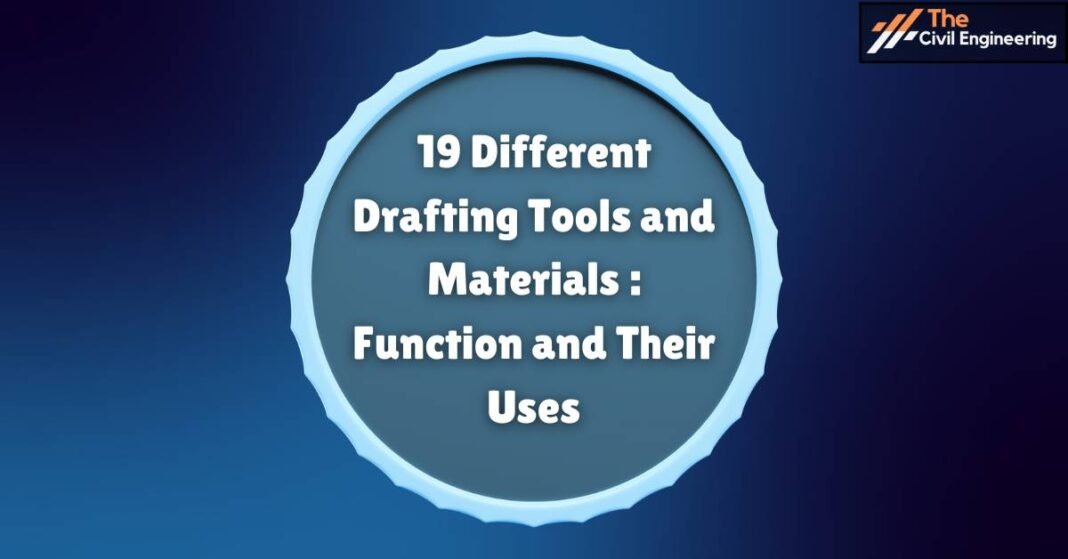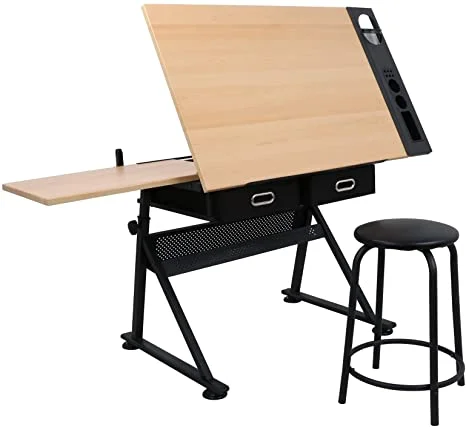✔ It is necessary to use proper drafting materials and tools to make an excellent drawing. These materials are generally utilized by architects, drafters, engineers, painters, or other technical persons.
✔ Drawing tools improve the accuracy and final output of any drawing.
✔ From artistic drafting to drafting of structures, all require proper drafting tools for accurate output. So, we will discuss essential drafting tools in this article.
A. Different Drafting Tools and Materials
The list of different drafting tools and materials is given below:
| Tool | Image | Uses |
| 1. Drawing Paper |
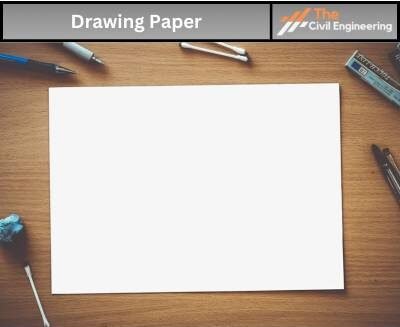 |
It is essential for drawing on and printing. |
| 2. Masking Tape | 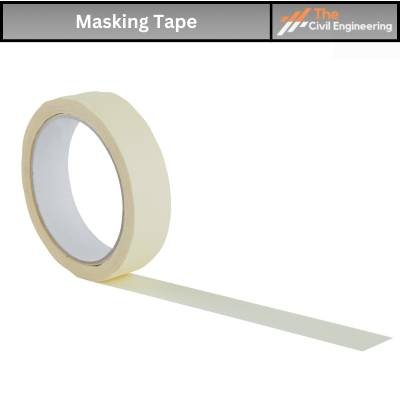 |
It secures paper on the drawing table without damage. |
| 3. Pencil Sharpener |
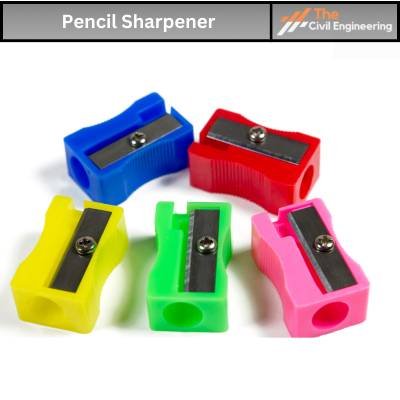 |
Sharpens pencils. |
| 4. Eraser | 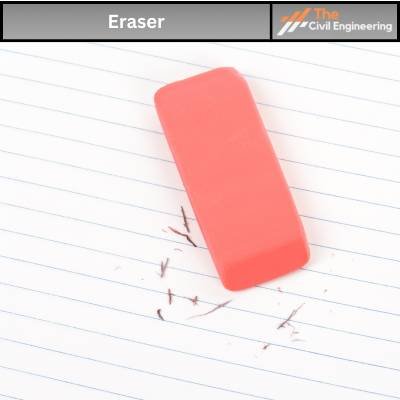 |
Removes unwanted marks; soft for smudges, hard for corrections. |
| 5. Drawing Pencil | 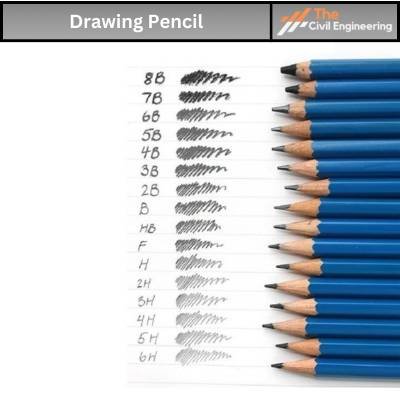 |
Graphite pencil for drafting; various grades for accuracy. |
| 6. Triangular Scales | 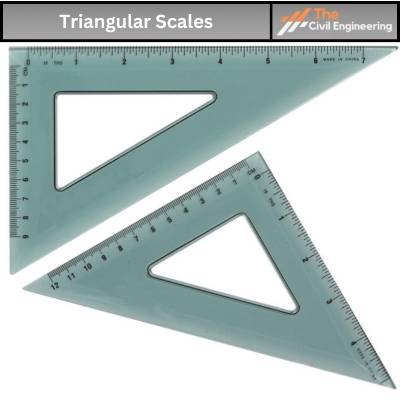 |
Reproduces drawings accurately in different proportions. |
| 7. Erasing Shield | 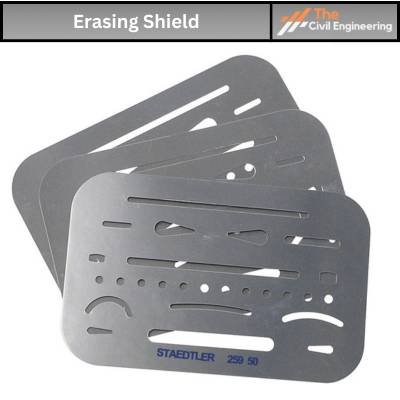 |
Saves drawings while erasing. |
| 8. T-square | 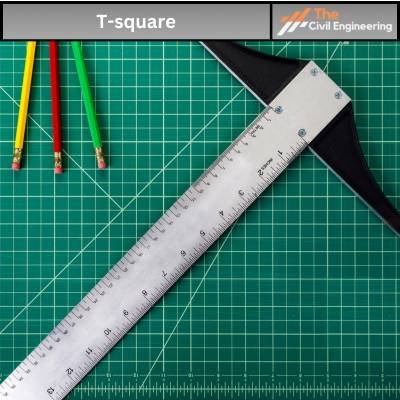 |
Draws horizontal lines; guides for vertical and perpendicular lines. |
| 9. Triangles Scales |  |
Three-sided ruler for angles; standard angles included. |
| 10. Compass | 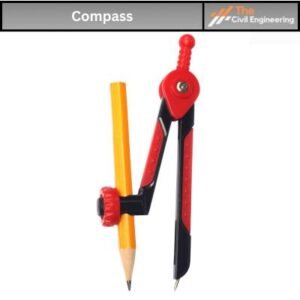 |
Draws arcs and circles. |
| 11. Divider | 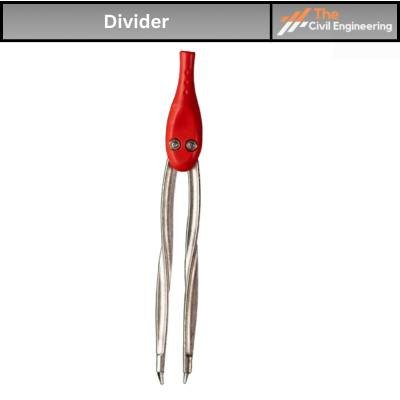 |
Moves measurements; divides lines and arcs. |
| 12. Protractor | 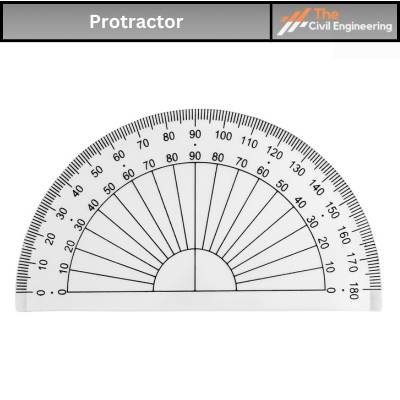 |
Measures arcs, angles, and circles. |
| 13. Drafter | 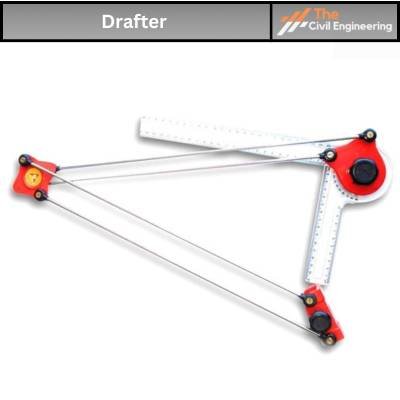 |
Prepares technical drawings and plans. |
| 14. Drawing Table | 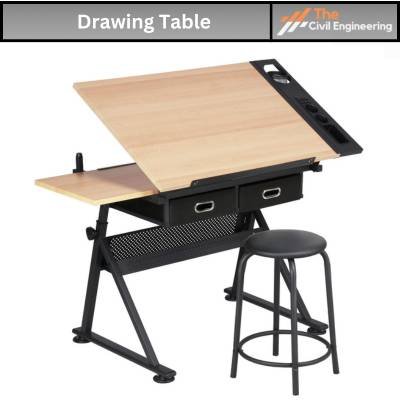 |
Surface for drawing; holds the paper in place. |
| 15. Drafting Lamps | 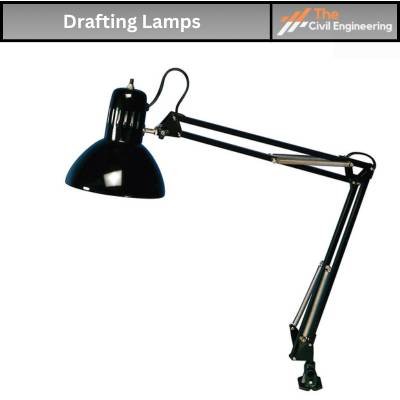 |
Adjustable lamps for focused work at night. |
| 16. Magnifying Glass | 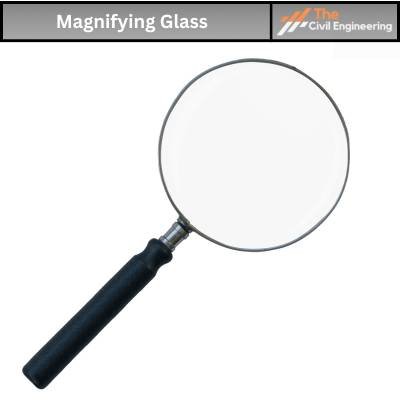 |
Examines small components in the drawing. |
| 17. Electric Erasers | 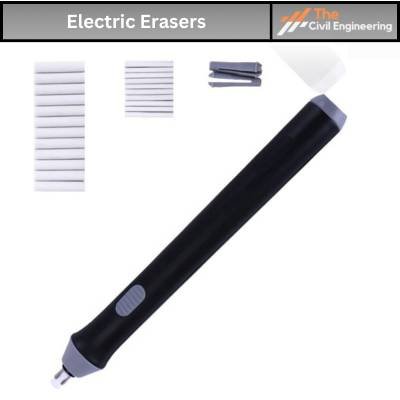 |
Accurate erasing without dirtying the paper. |
| 18. Blue Print Measuring Tool | 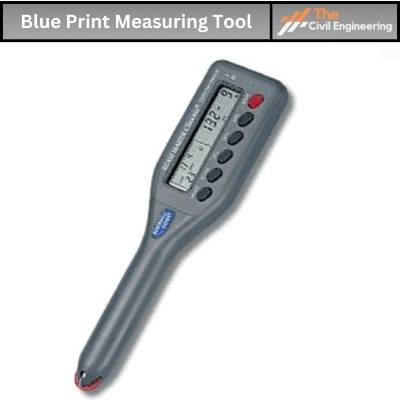 |
Calculates linear measurements from blueprints. |
| 19. French Curve | 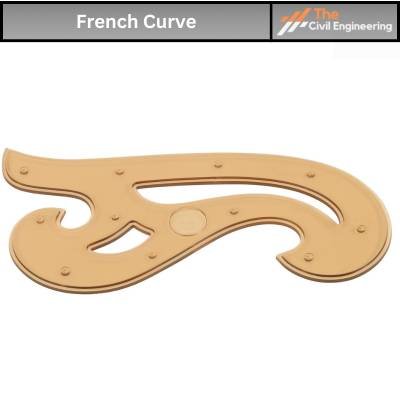 |
Creates perfect curves in artistic and technical drawings. |
1. Drawing Paper
Drawing paper is specially made for drawing.
✔ From making artistic drawings to heavy structural drawings, drawing Paper is vital.
✔ Not for making hand drawings only but also to print a hard copy of digital drawings; drawing Paper is needed.
✔ Different types of drawings require different types of drawing papers.

i. Selection of Drawing Paper for Work
Selecting the best drawing paper for specific work is quite complicated. So, to make your task more accessible, we have created this list.
✔ Harder & durable than ordinary papers.
✔ Mostly made up of rag pulp.
✔ Suitable For Letterheads, Typed reports, and Envelopes.
b. Gloss Coated Paper
✔ Coated with gloss.
✔ Highly shining in nature.
✔ Suitable For Flyers and Brochures
c. Matt Coated Paper
✔ It is the opposite of gloss-coated Paper.
✔ Coated with matt.
✔ It isn’t shiny.
✔ Suitable For Reports, Flyers, and Leaflets
d. Recycled Paper
✔ This Paper is made by recycling already utilized papers.
✔ Helps in reducing environmental impacts.
✔ Suitable For Reports, Memo papers, and Forms.
e. Silk Coated Paper
✔ Interim between gloss and matt.
✔ Smooth, silky coating is done.
✔ Paper is smooth to touch but does not have much shine.
✔ Suitable For Magazines, Books, and Catalogues
f. Uncoated Paper
✔ Absence of coat.
✔ Commonly used for official purposes.
✔ It is the most used and commonly available type.
✔ Suitable For Forms, Letterheads, Applications writing, Files printing, and Memo paper
g. Watermarked Paper
✔ It provides a luxury and premium look as it has the company’s watermark.
✔ Suitable For Documents, Exam Certificates, and Game Certificates.
ii. Different Sizes of Drawing Paper
| Paper size | Dimensions (cm) | Paper Area |
| Α5 | 14.8 x 21 cm | 0.03108 m2 |
| Α4 | 21 x 29.7 cm | 0.0612 m2 |
| Α3 | 29.7 x 42 cm | 0.125 m2 |
| Α2 | 42 x 59.4 cm | 0.25 m2 |
| Α1 | 59.4 x 84.1 cm | 0.50 m2 |
| Α0 | 84.1 x 118.9 cm | 1 m2 |
✔ Commonly, A3 & A4 Paper is utilized for official uses.
✔ A0 and A5 are not suitable for general works.
The dimensions in the drawing below are in centimeters.
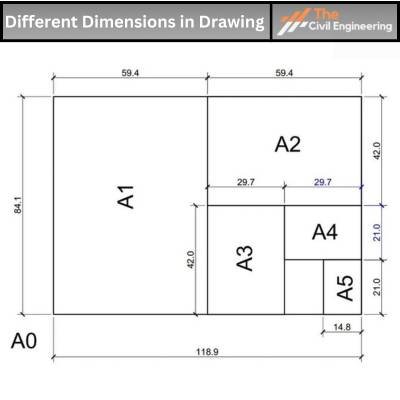
iii. Paper Weight Descriptions
| Weight | Feels Similar to: |
| 35-55 gsm | Most newspapers |
| 90 gsm | Mid-market magazine’s inner pages |
| 130-250 gsm | A good quality promotional poster |
| 180-250 gsm | Mid-market magazine cover |
| 350 gsm | Most reasonable quality business cards |
The Paper between 75 and 110 gsm is commonly utilized for official purposes.
2. Masking Tape
✔ This tape sticks the drawing paper on the drawing board.
✔ This tape is soft and doesn’t harm the drawing paper and table if appropriately handled.

3. Pencil Sharpener
✔ A pencil Sharpener is a mechanical gadget used for sharpening pencils.

4. Eraser
✔ An eraser is used to clean the unwanted drawings or dirt off the drawings.
✔ A soft eraser removes smudges and pencil marks, whereas a harder eraser is used for making changes and correcting errors in the drawing.

5. Drawing Pencil
A pencil is an essential tool in drawing as it is used for making drawings on Paper.
✔ For drafting, graphite pencil is commonly used.
✔ The grade of a pencil depends on the type of work.
✔ Hard Pencils are used where extreme accuracy is required, especially when working on graphs, diagrams, and charts. E.g., 2H Pencil, 4H Pencil, 6H Pencil, etc.
✔ Medium Pencils are used for general-purpose work in drawing. E.g., HB Pencil
✔ Soft Pencils are too soft to be used in mechanical drafting. They are beneficial for artwork of various kinds. E.g., 2B Pencil, 4B Pencil, 6B Pencil, etc.

a. Hardness of Pencil
We use graphite pencils for drawing and drafting. So, the hardness of graphite pencils is discussed below.
Before moving to the hardness of Pencil, we must know the following:
~ B stands for Black, and it shows softness.
~ H stands for Hard, and it shows hardness.
~ H.B. stands for Hard Black, and it shows medium-hard.
~ F stands for Firm.
The 16 degrees of graphite pencil hardness are: 8B, 7B, 6B, 5B, 4B, 3B, 2B, B, H.B., F, H, 2H, 3H, 4H, 5H, and 6H.
| S.N. | Pencil Hardness | Used In Making |
| 1. | 3B to 8B | Artistic and pictorial drawing |
| 2. | H, F, H.B., B, and 2B | All Common Drawing and Writing |
| 3. | 2H to 6H | Technical drawing |
6. Triangular Scales
✔ A tool generally used when reproducing a drawing in an enlarged or reduced form to some regular proportion.
✔ Its primary function is to reproduce the measurements of an object in full size, reduced size, and enlarged size.

7. Erasing Shield
✔ This is prepared of thin metal or plastic with irregular holes.
✔ It is helpful to save the rest of the drawing when removing smudges, needless pencil lines, and other dust.

8. T-square
✔ T-square is a drawing instrument used when making horizontal lines.
It is also used for guiding triangles when drawing vertical lines and perpendicular lines with the help of a set square.
✔ It is made of wood, plastic, or a combination.
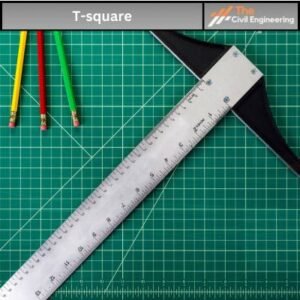
a. Fixed Head T-Square
The head is fastened to the blade. It is utilized for ordinary work.
b. Movable Head/ Adjustable Head T-Square
It has no fixed blade (movable head) and is utilized for occasional drawings.
c. Detachable Head /Removable Head T-Square
The blade and head can be separated. This makes it comfortable to carry.
9. Triangles Scales
✔ It is a three-sided ruler, which contains two equal sides intersecting at a 90-degree angle and the third side at 45, 30, and 60-degree angles.
Commonly used triangles are:
a. 30 degrees X 60 degrees
b. 45 degrees X 45 degrees

10. Compass
✔ A compass is a drawing instrument used to draw arcs and circles. It is utilized in the same way as a divider.
✔ It is made of two legs (i.e., a pen leg and a needlepoint leg ) being held together with a handle.
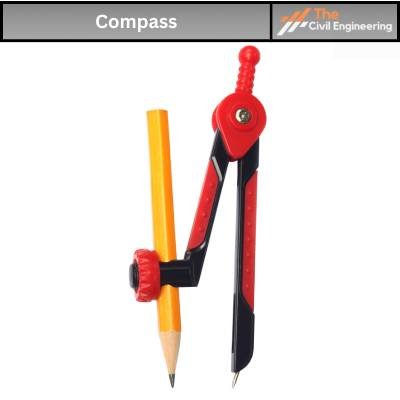
11. Divider
✔ It is utilized when moving measurements, dividing lines, and arcs into a given number of equal parts.
✔ It can quickly move accurate measurements by adjusting the divider points.

12. Protractor
✔ A semi-circular instrument is divided into 180 equal parts, each called a degree.
✔ It is utilized to calculate gradations of the degrees when measuring arcs, angles, and circles.

13. Drafter
✔ Drafters are used for preparing technical drawings and plans.
✔ Drafter is utilized in making technical drawings to design everything from microchips to skyscrapers.

14. Drawing Table
✔ The drawing table is made up of wood, plastic, or glass and has smooth surfaces where drawing Paper is placed and fixed with the help of tape.
| Designation | Length x Width (mm) | Recommended for use with sheet sizes |
| D0 | 1500 x 1000 | A0 |
| D1 | 1000 x 700 | A1 |
| D2 | 700 x 500 | A2 |
| D3 | 500 x 500 | A3 |
15. Drafting Lamps
✔ A drafting lamp is a very beneficial product for an engineer or architect. These lamps have adjustable arms and use fluorescent, halogen, or LED light bulbs.
✔ With the help of drafting lamps, we can do our work at night, which helps us focus on a particular section.

16. Magnifying Glass
✔ A magnifying glass is used to closely watch the small components in the drawing that are less visible to our eyes.

17. Electric Erasers
✔ Electric erasers are handy to remove or erase the tiny lines and borders in drawing more accurately.
✔ There is less chance of making drawing Paper dirty with an Electric eraser, saving the user a lot of time.

18. Blue Print Measuring Tool
✔ Blueprint measuring equipment is prepared for architects and engineers for their work. It simplifies takeoffs from architectural and engineering drawings because it can calculate the linear measurements of any shape.
✔ The wheel can be digital, analog, or hybrid. It can also move along maps, plans, blueprints, and other flat objects and then measure the measurements.

19. French Curve
A French curve is a drawing instrument composed of several curves commonly made from wood, plastic, or metal.
✔ It is used for making perfect curves.
✔ It is used in both artistic drawings as well as in technical drawings.

✔ French curve set ( Burmester set ) commonly consists of 3 curves.
✔ The Bottom Curve is mainly utilized for hyperbolas.
✔ Smaller Curve in the middle is used for ellipses.
✔ Large one Curve is used for parabolas.
